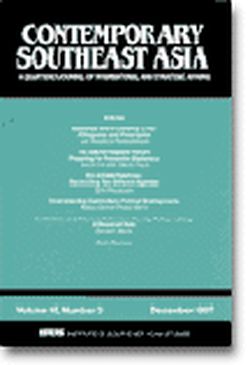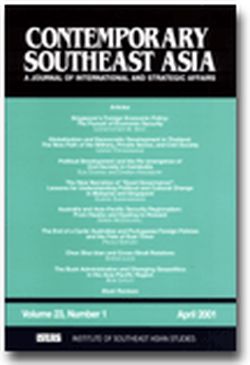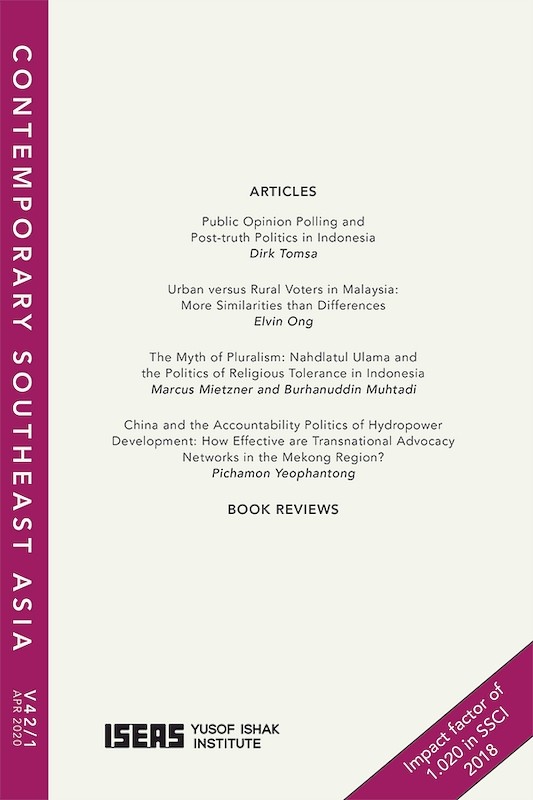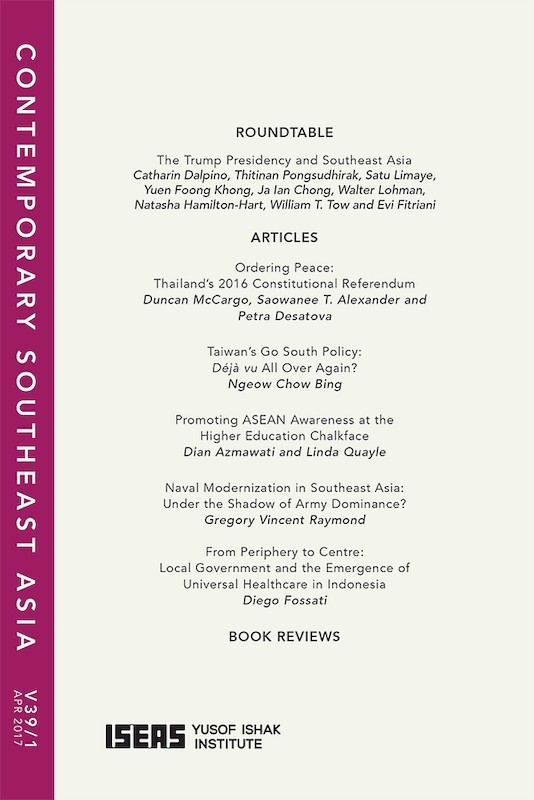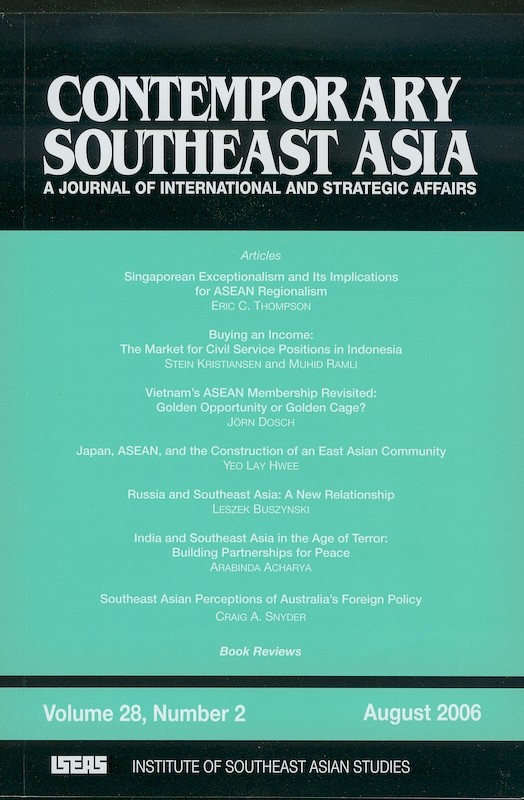Contemporary Southeast Asia Vol. 31/1 (April 2009)

Date of publication:
April 2009
Number of pages:
188
Code:
CS31/1
Contents
-
Contemporary Southeast Asia Vol. 31/1 (April 2009)
[Whole Publication] -
Preliminary pages
- ARTICLES
-
Vietnam and the Challenge of Political Civil Society, by Carlyle A. Thayer, author see abstractThe study of contemporary Vietnamese politics has been dominated by two main paradigms: "everyday politics" and civil society. This article argues that "everyday politics" and civil society paradigms have marginalized the study of pro-democracy groups that have contested the hegemonic role of the Vietnam Communist Party. It is argued that political change in Vietnam will be significantly determined by how Vietnam's one-party state manages the challenges posed by political civil society. Political civil society refers to the network of political groups that coalesced into a nascent social movement known as Bloc 8406. Overseas Vietnamese groups, such as the Viet Tan party, play an increasingly important role in providing financial and moral support for political civil society. The civil society paradigm is criticized for its exclusive preoccupation with so-called "non-governmental organizations" and community-based organizations as the prime agents of political change. The article concludes with an assessment of the future impact of political civil society on Vietnam and likely future scenarios.
-
Beyond the Limits? Outer Continental Shelf Opportunities and Challenges in East and Southeast Asia, by Clive Schofield, I Made Andi Arsana, authors see abstractThis article examines the process by which certain coastal states in East and Southeast Asia may confirm their sovereign rights over areas of continental shelf more than 200 nautical miles from their baselines - areas commonly termed the "outer" or "extended" continental shelf. The article provides an overview and explanation of this legally and technically complex process. It also highlights some of the numerous issues and uncertainties in respect of both the interpretation of the relevant provisions of the international law of the sea and practical aspects of the implementation of the process itself. Many states around the world, including in East and Southeast Asia, are striving to meet a deadline for submissions related to the outer continental shelf of May 2009. Existing and potential submissions are outlined. The potential opportunities and challenges associated with outer continental shelf are then discussed.
-
Public Sector Reforms and Financial Transparency: Experiences from Indonesian Districts, by Stein Kristiansen, Agus Dwiyanto, Agus Pramusinto, Erwan Agus Purwanto, authors see abstractAs in many Asian, African, and Latin American countries, democratization and devolution reforms have characterized the recent development of public management in Indonesia. This article analyses the current development of "good governance" in Indonesian local government. The main objective is to assess the level of transparency, the mechanisms for hiding, and the extent of corruption in district budgeting and accounting. The empirical data consists of 200 in-depth interviews with members of the executive, legislative and civil society institutions in six districts. The article concludes that national systems and traditions of politics and bureaucracy have a strong negative impact on local administrative procedures, leaving only marginal space for regional variance and improvements. There is a remarkable lack of transparency, and checks and balances in public financial affairs are largely absent in all districts.
-
Beyond the Barisan Nasional? A Gramscian Perspective of the 2008 Malaysian General Election, by Michael O' Shannassy, author see abstractThe March 2008 general elections in Malaysia have been characterized as a political "tsunami" with opposition parties enjoying stunning electoral success both at the federal and state levels. In the aftermath of these elections further upheavals in the Malaysian political landscape have taken place. However, is Malaysia witnessing a truly progressive moment, one that is long-term and structural, or is this instead a short-term, regressive, "restorative" moment? More specifically, what do the 2008 elections mean as far as the continuing evolution of Malaysias national identity is concerned? By adopting a Gramsican perspective and drawing upon some of Gramsci's key concepts this article endeavours to offer a more nuanced analysis of the recent elections and their meaning vis-Ã -vis (re)conceptions of national identity. In the process, this article seeks to explore the development and complex operation of hegemony with particular reference to notions of national identity in contemporary Malaysia.
-
Regionalism in the Asia Pacific/East Asia: A Frustrated Regionalism?, by Deepak Nair, author see abstractWhy have Asia's many projects in regionalism not been able to realize their stated goals, despite the fecundity of, and enthusiasm for, region-building initiatives over the last two decades? In an attempt to answer this question, this article identifies the pursuit of a holistic regionalism embodied in the desire for a regional community as a persistent goal in official discourse, and argues that an apparent state of frustration describes the difficulty of regional institutions and forums in bridging the growing gap between these articulated goals and actual outcomes. The empirical case for the argument here is provided by the founding of the East Asia Summit in 2005, which has disclosed the limits of both exclusive and inclusive models of regionalism in Asia. In exploring causation, the article argues that both structural and agential factors are at the heart of this problem. The tensions thrown up by the competing processes of realist and liberal-institutionalist order-building in Asia have imposed structural constraints on the ability of regional projects to realize their normative aspirations. Equally important in causing this state of frustration are the agents of regionalism - in particular, regional elites - who articulated the goal of a regional "Community" to propel regional projects, and have set the bar above the current capacities of regional institutions.
-
Sino-Japanese Relations: Interdependence, Rivalry and Regional Security, by Leszek Buszynski, author see abstractRivalry within interdependence is possible. Trade and investment ties alone are not sufficient to bring peace and security to a relationship, the responsiveness of the political leadership to economic interdependence is critical. Responsiveness can be influenced by a history of conflict in a relationship, national ambitions or by a military which espouses expansionist plans. Britain and Germany before 1914 demonstrated that interdependence and rivalry can coexist and may degenerate into war. This can happen when one side under the influence of a dominant military falsely assumes that the other would be constrained by interdependence from responding to its military action. Both Japan and China have become bound by a tight economic interdependence despite their historical animosities. These animosities could be exacerbated by military modernization and China's plans to develop a naval capability to protect its sea lanes. Japan would be prompted to respond to the development of Chinese naval power which would aggravate existing rivalry with Beijing. To reduce the impact of this rivalry both ASEAN and the United States should clearly signal to Beijing that military action over Taiwan or naval expansion without transparency would be unacceptable. Otherwise false assumptions would arise in Beijing that interdependence would constrain responses to China's risk taking.
- BOOK REVIEWS
-
BOOK REVIEW: Ethnic Politics in Burma: States of Conflict. By Ashley South., by David Scott Mathieson, author
-
BOOK REVIEW: Party Politics and Democratization in Indonesia: Golkar in the Post-Suharto Era. By Dirk Tomsa., by Benny Subianto, author
-
BOOK REVIEW: Thai South and Malay North: Ethnic Interactions on a Plural Peninsula. Edited by Michael J. Montesano and Patrick Jory., by Marc Askew, author
-
BOOK REVIEW: India and ASEAN: Partners at Summit. Edited by P.V. Rao., by Pavin Chachavalpongpun, author
-
BOOK REVIEW: Hard Times in the Lands of Plenty: Oil Politics in Iran and Indonesia. By Benjamin Smith., by Andrew Sheng, author
-
BOOK REVIEW: The Talibanization of Southeast Asia: Losing the War on Terror to Islamist Terrorists. By Bilveer Singh., by Antonio L Rappa, author

